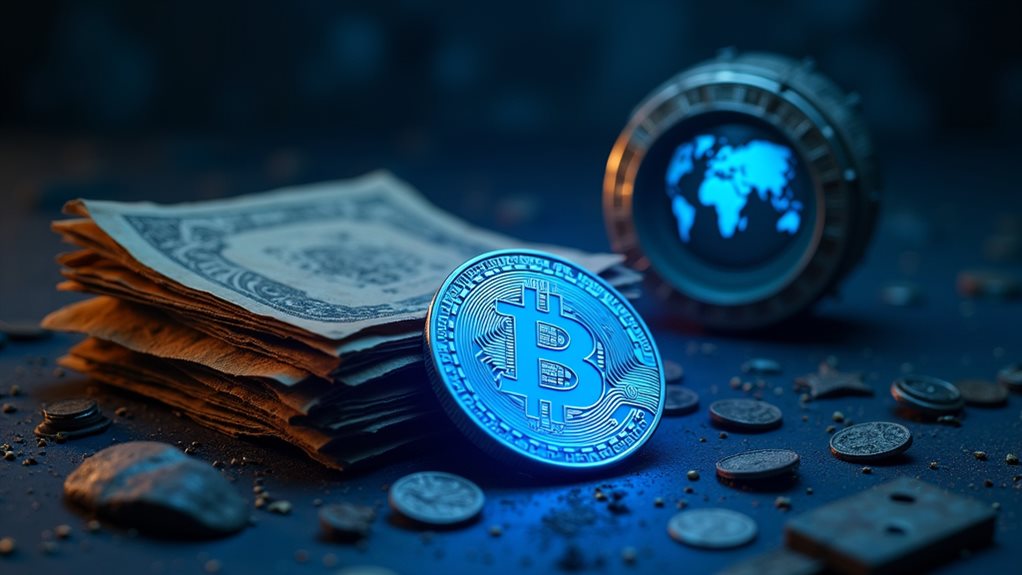Bitcoin outperforms traditional currency in several key areas. It operates independently from government control, completes transactions within minutes instead of days, and utilizes advanced cryptography for security. Unlike traditional money that governments can print endlessly, Bitcoin has a fixed supply cap of 21 million units, protecting against inflation. Its decentralized nature and privacy features make it a technological powerhouse compared to old-school banking. The full story of Bitcoin's advantages goes deeper than most realize.

While traditional currencies continue their centuries-old dance with government control and inflation, Bitcoin has stormed onto the global stage as a radical alternative. Unlike its aging predecessors, Bitcoin operates on a decentralized blockchain system, completely independent from government whims and central bank manipulations. No more begging banks for permission to move your own money – Bitcoin users transact directly with each other, anywhere in the world, anytime they want.
Traditional banking's notorious fees and delays look almost comical next to Bitcoin's efficiency. Want to send money across borders? Traditional banks might take days and charge a fortune. Bitcoin? Minutes, with minimal fees. Global accessibility allows anyone with an internet connection to participate in the financial system. No more waiting for banker's hours or dealing with endless paperwork. Just hit send, and it's done. And forget about those annoying charge-backs – once a Bitcoin transaction is confirmed, it's set in stone.
Traditional banking feels like watching paint dry, while Bitcoin zips around the globe at lightning speed, leaving paperwork and fees in the dust.
Security? Bitcoin's got that covered too. While traditional banks rely on outdated security systems and are constantly getting hacked, Bitcoin uses advanced cryptography and a public ledger system that makes tampering virtually impossible. Advanced encryption techniques ensure the highest level of security for every transaction. The decentralized ledger system provides an immutable record of all transactions, making it virtually impossible to alter or manipulate. Miners verify every transaction, creating a security network that would make Fort Knox jealous. Try hacking that, cybercriminals.
The economic advantages of Bitcoin are particularly striking when compared to traditional currency. While governments can print money at will (hello, inflation!), Bitcoin has a fixed supply cap of 21 million units. That's it. No money printer going "brrr" here. This limitation helps protect against the kind of hyperinflation that's turned some traditional currencies into expensive wallpaper. With record market highs in 2024, Bitcoin's value proposition continues to strengthen against traditional currencies.
Privacy? Traditional banks know everything about your spending habits – where you shop, what you buy, when you buy it. Bitcoin offers a revitalizing alternative with pseudonymous transactions. While not completely anonymous, it provides considerably more privacy than traditional banking's glass house approach.
The technological innovation behind Bitcoin makes traditional banking look like it's stuck in the Stone Age. Smart contracts, Lightning Network, DeFi integration – these aren't just fancy buzzwords. They're real innovations that are revolutionizing how we think about money and financial transactions. Meanwhile, traditional banks are still figuring out how to keep their websites from crashing during business hours.
As more merchants embrace Bitcoin, the gap between digital and traditional currency continues to widen. Sure, traditional currency isn't going anywhere soon, but Bitcoin's advantages – from its decentralized nature to its technological superiority – make it an increasingly compelling alternative. The future of money might not be in your wallet – it might be in your digital wallet instead.
Frequently Asked Questions
How Do I Protect My Bitcoin Wallet From Hackers and Cybercriminals?
Protecting Bitcoin wallets isn't rocket science, but it's close.
Smart crypto owners use hardware wallets – those little USB-looking things that keep private keys offline.
Two-factor authentication? Yeah, that's non-negotiable.
Cold storage beats hot wallets every time, and anyone using public Wi-Fi for transactions is basically asking for trouble.
Multi-signature setups make thieves work harder, while regular backups guarantee peace of mind.
Hackers hate this stuff.
Can Governments Track My Bitcoin Transactions and Tax My Cryptocurrency Earnings?
Yes, governments can track Bitcoin transactions – it's not as anonymous as people think.
The blockchain is public, after all. Through tools like Chainalysis and partnerships with exchanges, authorities can link transactions to identities. Those "private" crypto gains? Tax agencies want their cut.
KYC requirements on exchanges make it easier to track who's doing what. While decentralized platforms offer more privacy, governments are getting better at blockchain analysis every day.
What Happens to My Bitcoin if the Internet Goes Down Globally?
Bitcoin holdings stay safe during internet outages – they're just frozen in the blockchain.
Think of it like a digital vault that's temporarily locked. Short outages? No big deal. Global internet apocalypse? That's trickier.
While the coins remain secure, actually using them becomes impossible without connectivity. Some alternatives exist – satellite networks, mesh systems, even SMS transactions.
But a permanent worldwide outage? Bitcoin would basically become digital paperweights until connectivity returns.
How Does Bitcoin Mining Impact the Environment and Energy Consumption?
Bitcoin mining is an environmental nightmare. Period. It devours electricity like a hungry beast – we're talking entire countries' worth of power consumption.
The numbers are staggering: up to 121 terawatt-hours annually, spewing out up to 90.6 million metric tons of CO2. Mining operations create significant air pollution, affecting millions of Americans.
While some miners use renewable energy, most still rely on fossil fuels. Plus, all those outdated mining rigs? They're becoming e-waste mountains.
Why Does Bitcoin's Price Fluctuate so Dramatically Compared to Traditional Currencies?
Bitcoin's wild price swings come down to a perfect storm of factors.
Unlike traditional currencies, it lacks central bank control – no safety net here. Market sentiment runs the show, with news and tweets sending prices soaring or crashing.
Add in some speculative trading, market manipulation, and institutional investors making big moves. Limited liquidity means even small trades can cause dramatic ripples.
Throw in regulatory uncertainty and boom – you've got a roller coaster ride.









